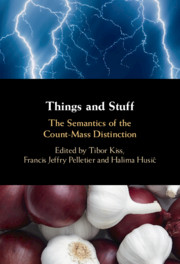Book contents
- Things and Stuff
- Things and Stuff
- Copyright page
- Dedication
- Contents
- Figures
- Tables
- Contributors and their Affiliations
- Preface
- 1 Editorial Introduction: Background to the Count–Mass Distinction
- Large-Scale Architectures for Count and Mass
- Implications from Individual Languages
- Compositional Analyses and Theoretical Issues
- 10 Ontology, Number Agreement, and the Count–Mass Distinction
- 11 The Semantics of Distributed Number
- 12 Container, Portion, and Measure Interpretations of Pseudo-Partitive Constructions
- 13 Overlap and Countability in Exoskeletal Syntax: A Best-of-Both-Worlds Approach to the Count–Mass Distinction
- New Empirical Approaches to the Semantics of the Count–Mass Distinction
- References
- Language Index
- Subject Index
13 - Overlap and Countability in Exoskeletal Syntax: A Best-of-Both-Worlds Approach to the Count–Mass Distinction
from Compositional Analyses and Theoretical Issues
Published online by Cambridge University Press: 21 May 2021
- Things and Stuff
- Things and Stuff
- Copyright page
- Dedication
- Contents
- Figures
- Tables
- Contributors and their Affiliations
- Preface
- 1 Editorial Introduction: Background to the Count–Mass Distinction
- Large-Scale Architectures for Count and Mass
- Implications from Individual Languages
- Compositional Analyses and Theoretical Issues
- 10 Ontology, Number Agreement, and the Count–Mass Distinction
- 11 The Semantics of Distributed Number
- 12 Container, Portion, and Measure Interpretations of Pseudo-Partitive Constructions
- 13 Overlap and Countability in Exoskeletal Syntax: A Best-of-Both-Worlds Approach to the Count–Mass Distinction
- New Empirical Approaches to the Semantics of the Count–Mass Distinction
- References
- Language Index
- Subject Index
Summary
In this chapter, we will offer a new way of analysing the syntax and semantics of the mass/count distinction at the syntax-semantics interface, by synthesising the constructionist framework originating in Borer (2005) with the (lexicalist) `iceberg semantics' proposed in Landman (2011, 2016. We believe that this synthesis has several conceptual and empirical advantages over existing frameworks. It combines the flexibility and morphosyntax-driven nature of constructivism with an explicit role for human conceptual categories such as INDIVIDUAL and SUBSTANCE. It allows us to distinguish between different kinds of mass/count shifts and makes explicit why some of them are harder than others. Furthermore, it clarifies the distinction between stuff-reference, number neutrality and non-countability, three distinct (although interdependent) nominal properties that are often explicitly or implicitly conflated in existing accounts of the mass/count distinction.
Keywords
- Type
- Chapter
- Information
- Things and StuffThe Semantics of the Count-Mass Distinction, pp. 305 - 318Publisher: Cambridge University PressPrint publication year: 2021
- 1
- Cited by



